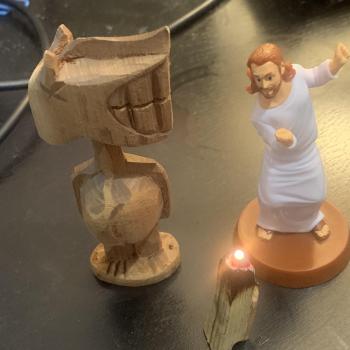Sermon for 1/15-16/2011
Text: Psalm 40:1-11
We live in a world of competing narratives. Nothing just happens anymore. Every event that gets reported in our news is either evidence of why our society is going down the drain or a model of hope that should make us all proud to be Americans. And what every blogger, columnist, and pundit wants is for their version of the story to be the story that “wins” the most believers. Last weekend’s shooting in Arizona has generated the latest example of this fierce battle of narratives. The left-wing pundits want the shooting to say one thing about American society and the right-wing pundits want it to say something different. We probably won’t ever know the “real story” of Jared Loughner. I think the only thing that’s safe to say is that kid didn’t know how much God loves him because he wouldn’t have done what he did if he knew.
Just like pundits and bloggers are locked in a struggle to come up with the winning story for every major event, God and Satan are fighting to tell the winning story for what has happened in our lives. We can look at the same hardships, advantages, challenges, and achievements that make up our lives and interpret them one way according to Satan’s story and another way according to God’s story. Our scripture reading for today, Psalm 40, is a model for how people talk about their lives when God’s version of the story is the story that wins their trust. This psalm is not just a testimony of God’s deliverance; it is also about how those who have been delivered cannot keep quiet when they realize what God has done for them; it’s about the “new song” that God puts in our hearts for us to sing to everyone around us until they start singing it too.
If this psalm is what God’s story for our lives sounds like, then what does Satan’s story sound like? First, I should say that the word “Satan” in its original Hebrew was not so much the name of a specific person as a description of a type of person. In its verb form, the word means to accuse or taunt. Thus, a proper translation of Satan into modern-day English would be “the heckler,” or to use teenage slag, “the hater.” I don’t know about you, but there’s a part of me that has a cynical explanation for everything I see, and it tempts me to live in cynicism rather than in trustful obedience to God. I feel like this part of me is the presence of Satan in my life.
Satan is the voice that tries to keep us from being moved by God. This voice denigrates and ridicules our attempts to see God’s love in our lives. It prods us to take personal credit for everything God has done for us and to act as though we earned every undeserved blessing we have received. Satan also helps us find a way to blame every setback we have had on somebody else. Satan doesn’t want us to recognize the pits that we fall into and the mud that we get stuck in, because ultimately Satan’s goal is to keep us in the pit.
Now the pit that the psalm describes doesn’t have to be a deep, dark, and smelly pit. It’s actually a lot easier to know you need God’s help if the pit you’ve fallen in is dramatic and devastating enough. It’s trickier when the pit where we’re stuck is simply the way that our lives have fallen into very comfortable routines we don’t recognize our need to break out of. In this case, Satan’s story wins as long as we stay comfortable and don’t allow ourselves to be challenged or exposed to any experience that might get us too excited about Jesus. It’s okay with Satan for us to go to church every week as long as it remains a routine that we don’t give too much thought. Because if we get excited, then we might get other people excited about Jesus and before long our church will be so filled with excitement that the people who come here will take their excitement to the streets.
Our greatest defense against Satan’s attempts to hold us down in a pit with his false story about our lives is to read and listen to the testimony of people who share what God has done in their lives, because the testimony of others teaches us how to recognize and tell the story of what God is doing for us. This is actually what we are doing when we read the Bible, because the Bible is not primary a book of rules; it is primarily a book of testimony. Some of them were ancient Israelites; some were Jesus’ disciples; they all had lives with ups and downs just like ours, but the Holy Spirit inspired them to see God’s story in what they lived through.
If we read this testimony long enough and relate it to the events in our lives, then we will reach a moment when we say along with the psalmist, “Here I am; in the scroll of this book it is written of me.” When God’s story becomes our story, we are transformed from reasonably consistent churchgoers into fired-up disciples of Jesus Christ who have a new song within our hearts. We become witnesses who testify just as the psalmist testifies, and God adds our testimony to the many stories He has used throughout time to bring in new believers and build up the church. God’s story, told through a host of faithful witnesses throughout the centuries, is the thread that holds the fabric of the church together.
Now I want to look at an important distinction that Psalm 40 makes. It says, “Sacrifice and offering you did not desire— but my ears you have opened.” The way we become part of God’s family is not simply by engaging in a set of rituals or even sacrificing a certain portion of our time or resources. As long as our ears remain unopened to God’s story, no amount of time we spend doing church-work and no amount of money that we put in the offering plate will make us disciples of Jesus Christ. What matters is whether our ears have been truly opened to God through the act of “putting our trust” in God’s story. When we do put our trust in the Lord, then it changes our perspective so that the same events that have always happened in our lives become “wondrous deeds” of God that we didn’t notice before, which start to “multiply” the more our eyes are opened, and quickly grow to be “more than can be counted.” When our ears have been opened to God’s story, then giving our time, our skills, and our resources to God’s mission is not just something we feel like we ought to do but what God inspires us to do as a natural expression of the “new song” that God has put into our hearts.
This brings us to the topic we have been discussing as a church these past couple of weekends. Stewardship is not about sacrifice; it’s about trust. Sacrifice is what you do when you want to keep on living your life on your own terms instead of God’s. You say, God, I will give you this amount of money and time each Sunday morning, if you promise not to bother me with anything else. God isn’t one of those phone solicitors who keeps on calling until we cave and write a check; He’s not a Mafioso who goes around to all the local shopkeepers to collect a fee for “divine protection.” God’s a whole lot more deeply involved in our lives than that.
God is the source of every good thing that has ever happened to us. Everything our parents ever taught us, every chance we ever got, every kind word that ever encouraged us are all part of how God has been reaching out to us in love since the day we were born. Now we can attribute all these things to luck, hard work, having good genes, being born into the right family – there are many ways to tell our story. But the only way to hear the “new song” that God has put into our hearts is to tell our story the way that Psalm 40 does – understanding that God has been there to help every time we fall into a pit and every time that we see ourselves standing on solid ground again, it is because God delivered us. And if our lives have involved more muddy pits than solid ground, then the best way to make it and keep our hope alive is to sing the song of God’s deliverance anyway.
If I truly believe that God has delivered me, then I’m not going to “hide that saving help within my heart.” I’m going to “tell the glad news of my deliverance in the great congregation” that is the world. I’m going to give all that I am and all that I have to the cause of making God’s story the story that wins the hearts of everyone. I’m going to sing God’s song in a life of gratitude and love for others so that “many will see” and be left in that state of awesome wonder that the Bible calls “fear,” which will cause them to “put their trust in the Lord.”
Let this be the year when your heart sings a new song. Ask God what you can do and what you can give to make God’s song heard throughout the world. Let this be our response to the story Satan tries to tell about how the world is a dark and hopeless place that there’s no point in trying to change. God’s story will win; let your story be part of the victory.











